Editor's Note: Townhall's investigative reporting exposing the disgusting, woke ideology of the left would not be possible without the support of our VIP members. Join Townhall VIP and use promo code INVESTIGATE for 40% off to directly support the vital work of Mia Cathell and help us continue to shed light on the darkest parts of the radical left.
As the criminal prosecution proceeds against the Zulocks, a gay Georgia couple who allegedly filmed themselves raping their young sons, disseminated "homemade" child pornography of the years-long sexual abuse, and prostituted the two 9- and 11-year-old boys seemingly for profit, the civil case pertaining to the seizure and forfeiture of the married men's property is underway. During the armed raid on their two-acre mansion in July 2022, the mysteriously wealthy Zulocks lost it all overnight: custody of the adopted children, who are back in the foster-care system that put them there in the first place; the home itself, which is now the "Property of the Walton County Sheriff's Office," according to a sign affixed to the front door; and everything inside. See for yourself what the state seized from the Zulock mansion in suburban Oxford, Georgia:
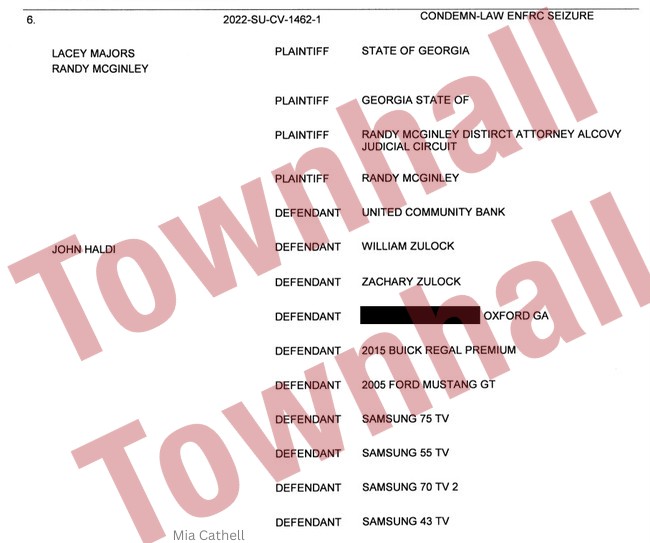
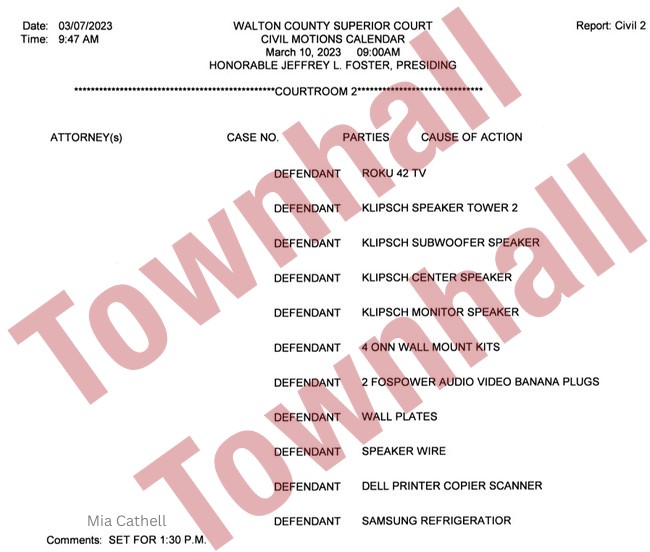
The property seized from the Zulock mansion | Walton County Superior Court
The custom-designed house, which was constructed from the ground up within a matter of months in 2020 on a DMV worker's and a retail banker's salaries, two cars, five TVs, a Dell all-in-one printer, and a Samsung fridge were among the items listed on the docket ahead of the March 10 civil forfeiture hearing where the Zulocks appeared in court next to each other for the first time.
Recommended
In addition to the pair of vehicles, the Zulocks owned a red 2022 GMC Sierra truck, which is believed to be repoed.

One of three cars parked in the Zulock mansion's driveway | Zachary Zulock (Facebook)
When the boys moved in with their adoptive fathers prior to the 2018 adoption's finalization, the Zulocks lived at a moderate-sized residence. Frequent vacations, a trove of high-end tech gadgets, and the mansion materialized not long after, a family member exclusively told Townhall. One of their many TVs transmitted live footage—watched via a 4x4 matrix—from the 16 surveillance cameras positioned all over the premises. An indoor camera captured video of a bedroom with an aerial shot of a mattress.
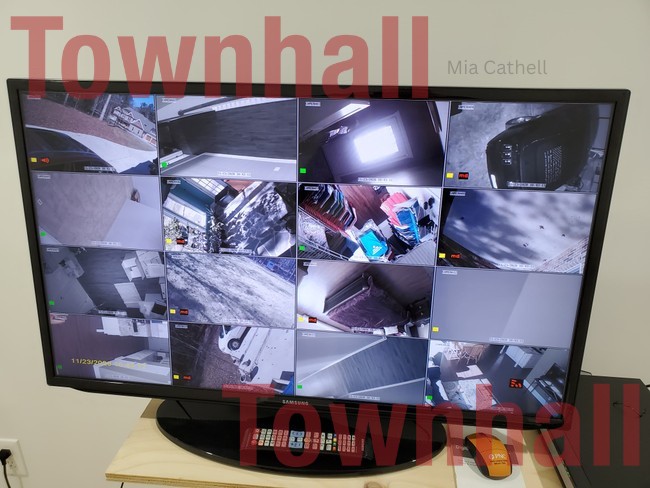
Room-by-room security set-up | Zachary Zulock (Facebook Messenger)
Before the grand jury returned a 17-count felony indictment, the prosecution was considering pursuing state-level Racketeer Influenced and Corrupt Organizations (RICO) Act charges against the Zulocks under Georgia's child sex trafficking statute.
In the Peach State, the state possesses the power to impose civil remedies. For instance, a judge may order a defendant to forfeit any ill-gotten gains acquired through a RICO violation. However, neither RICO violations nor trafficking charges were filed.
Nonetheless, Georgia's civil asset forfeiture legislation, which is designed to take down high-level organized crime, allows law enforcement to seize and sell property—considered contraband—alleged to be connected to criminal activity, as involved in or derived from the commission of a crime. In past cases of drug-related seizures, the public could bid online at GovDeals.com, a liquidity services marketplace where government agencies can auction off confiscated personal property over the Internet.
At the mid-March forfeiture proceeding, the Zulocks sat side-by-side except for their defense attorney John E. Haldi separating the two, marking the first face-to-face appearance for the same-sex couple since the August parental rights hearing when the men relinquished custody of the two boys to the state. Zachary Zulock, donning an orange-and-white inmate uniform and slip-on shower shoes, celebrated his 36th birthday this month in Barrow County Detention Center where he's being held separately from his jumpsuit-clad husband William Zulock, who's locked up in Walton County Jail. Both were shackled while in the courtroom.
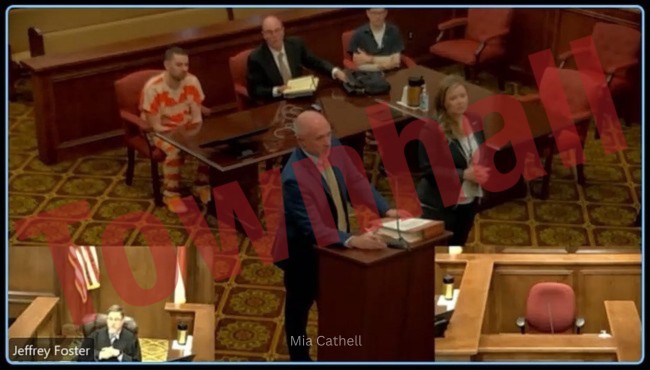
DA McGinley at the podium in front of Zachary (left) and William (right) Zulock
Haldi, claiming why he needs to inspect the property in question, told the court halfway through the joint hearing:
This is not a case of where the Grinch stole Christmas, and literally, every last morsel of food, every last piece of tinsel was taken from the Domus. It's my understanding that there were some selective taking. There were televisions and stereo systems taken. I believe a refrigerator was listed as taken. I don't know if that was—yes, a refrigerator was named in the complaint, a Dell printer. But then from the seizure and search inventories that I see, I see items taken from the garage, including power drills, a Gorilla ladder, [and] various, sundry equipment that is not named in the complaint that I would want to go verify. A, was it taken? And upon my investigation, try to see if anyone could tell me why it was taken. So, I can anticipate having to inspect the defendant real property, perhaps a car impound lot, and maybe evidence, lockers, or rooms within the sheriff's department. So I think there are probably at least three places I'm going to need to go.
Walton County's District Attorney Randy McGinley has filed a motion for a more definitive statement that determined that the defense's amended answer is "still deficient" per § 9-16-12, which the state is proceeding forward under. Judge Jeffrey Foster, who is presiding over the criminal case as well, considered McGinley's motion based on the lack of purchase details the Zulocks provided, as Subsection C(1)(D) of the civil forfeiture law calls for. 20 additional days would be permitted to amend the claim.
"I don't think there's anything remotely related as to any of the other personal property—as to the circumstances of purchase dates. Some of that may not be known," Foster commented, recommending that the Zulocks plead upon the belief that the information was gathered to the "best of the claimant's knowledge." But, "we know the vehicles are there," Foster continued. "So there should be a timeframe of a date of purchase, maybe even a dealership [...] I get it with a lot of the personal property. Sometimes, [we] may or may not have a recollection, but we may remember, even a rough timeframe, of when we bought the Klipsch sound system or, you know, when we got our TVs, even if it's [...] we bought it from Amazon; we bought it from Best Buy."
Haldi insisted that he requires access to the property, prompting Foster to suggest that the lawyer confers with his clients at the hearing's conclusion. "So they may remember roughly when they or where they bought it. It may have accompanied—I hope that nice sound system would come with the 70-inch TV, not the 43-inch TV, so there may be some correlations that they can give you that would let you supplement it," Foster responded, noting supplementation can always be added during the discovery phase.

Zachary's post about furnishing the mansion's "movie room" | Zachary Zulock (Facebook)
Foster explained that if the court were to "throw the switch on discovery," pursuant to § 9-11-34, Haldi would have the opportunity to request inspection, but discovery entails that the defendants would be subject to depositions, sworn out-of-court testimony, and interrogatories, written questions that must be answered. "Did that make everything clear as mud?" Foster asked, adding: "But certainly, it's something [the Zulocks] probably need to contemplate in the fullness—with a complete understanding of that."
McGinley brought up that while fair representation has been dealt with in the criminal case, where Zachary has acquired a new attorney separate from Haldi, the state is concerned about a conflict of interest with Haldi representing both Zulocks in the civil matter. Though, it's "a bit less of a severe issue," McGinley stated. "What they're facing...is forfeiture of things, not life in prison."
"If we pulled the trigger on the discovery, it's going to start a time clock running," Foster said, and he doesn't want both parties to "chew up" days spent with back-and-forth deliberation "hammering out" the conflict issue. "I mean, it's the pink elephant in the room. We've got to have some resolution of that issue," the judge went on, given that the allegations in the criminal case form "the underlying basis by which the state seeks the forfeiture." Zachary waiving conflict is warranted then for Haldi to remain as legal counsel, Foster stated, and he ought to make an informed decision on the advice of newly acquired independent counsel.
Addressing Haldi, Foster said it's "safer for everybody involved, you included. If something does not turn out the way someone expects, it insulates you from accusations down the road as well as protects their cases, gives them the opportunity to assess."
Foster also mentioned invoking § 9-16-15 to stay the civil forfeiture proceeding pending the criminal case's results, whether a guilty plea, a conviction, or an acquittal. "I'm just waiting at any minute [...] which might be something to do." Haldi agreed, "That's out there," to which, Foster replied, "I would grant it considering the severity of the case. I would rather us address that sooner rather than later, instead of keep jumping through hoops for something that we're going to then ask to throw the brakes on."
For now, Foster held off on signing an order until the March 22 motion hearing in the criminal case. "I just need to know at that time [...] It's just like a thumbs-up. Yes for discovery; no for discovery," he said, plus wanting an on-the-record waiver of conflict.
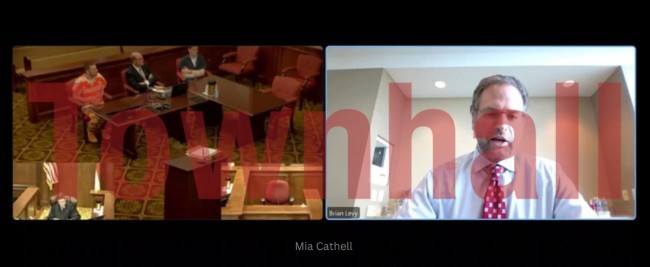
Levy speaking at the virtual courtroom appearance on March 10
Chiming in virtually, Brian Levy of the law firm Burr & Forman, who has "extensive experience" litigating and arbitrating disputes involving claims under the federal and state RICO Acts, said he was retained a week ago but is trying to file a motion to sell the Zulock mansion and "maximize the value of the property." The mortgage hasn't been paid since July, the month of the arrests.
"Everybody knows that a vacant property gets easier and easier to sell and goes up and up in value," Foster interjected. "That's right," Levy concurred. "And also avoids people vandalizing it, which is definitely a concern in this case," he emphasized.
Stay tuned for Townhall's coverage as we continue to closely follow the ongoing Zulock case.
Read Part 1, Part 2, Part 3, and Part 4 of Townhall's initial multi-part investigation.


















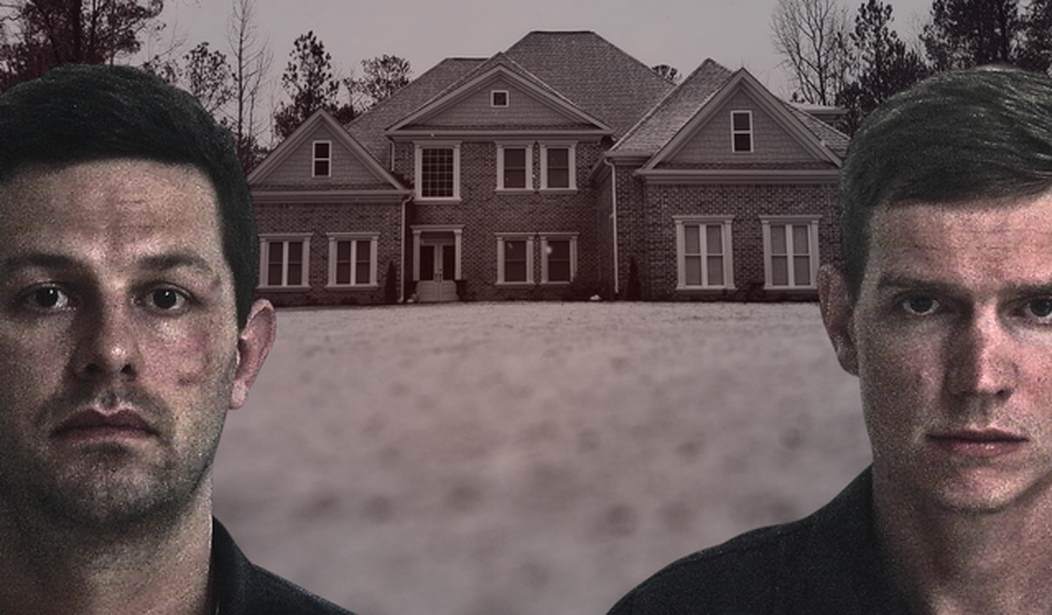








Join the conversation as a VIP Member